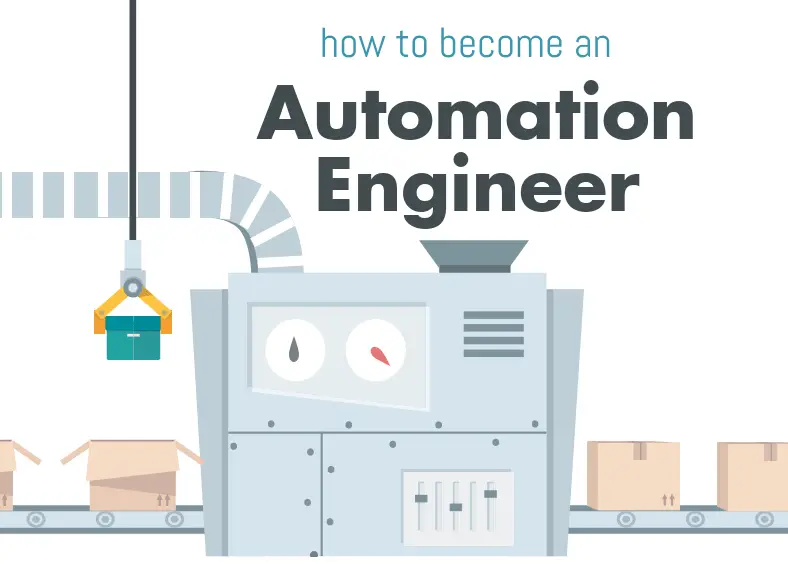Although there are other paths to take, a very effective route for becoming an automation engineer is to follow these general steps:
1. Excel in coursework in math, science, electronics and drafting in high school
2. Determine if this occupation is suited to your interests, qualities and traits
3. Pursue a bachelor’s degree in a relevant field of engineering, such as Electrical Engineering
4. Pursue a co-op or internship opportunity as a student
5. Put yourself ahead of the crowd by getting additional education/experience
6. Get an automation engineer job once you’ve graduated
7. Move into roles of greater pay and responsibility as you gain experience and confidence
Below we've expanded on these points, to give you a more complete idea of what you'll need to begin a career as an automation engineer in the United States or Canada...starting with the education you'll need.
What Education Will I Need?
Employers in this field typically prefer to hire candidates that have a bachelor’s degree in a relevant field, such as electrical or mechanical engineering. Some employers may require that you have a master’s degree, particularly for research and teaching positions.
Not-so-fun fact: Unfortunately, in the US and Canada, there are not many degree programs specifically offered for automation engineering, which would be a natural fit for this career.
How Can I Prepare for This Career in High School?
You can begin preparations for this career while you’re in high school by excelling in courses such as calculus, physics, chemistry, drafting and electronics. Excelling in these areas will help you develop necessary skills and competencies and will help you qualify for university engineering programs.
What is an Automation Engineer?
Automation engineers are responsible for creating and applying technologies that control or monitor production and delivery in both product and service-oriented industries.
They are responsible for designing, programming, simulating, and testing automated machinery or processes that are intended to complete precise tasks, such as robots used in packaging, food processing, or vehicle manufacturing, for example.
Automation engineers work with automated machinery from concept to prototype, and are responsible for providing detailed documentation including design specifications that enable the production or application of their products.
What Do They Do?
Although their duties can vary from job to job, automation engineers are generally responsible for the following tasks and duties:
• Designing, developing and testing automated machines
• Troubleshooting problems with mechanical equipment
• Designing process improvement projects
• Maintaining current knowledge of industrial information technology
• Improving cost saving and productivity by implementing newest automation technologies
• Assisting with the installation of new machines and transferring equipment
• Participating in preventative and corrective maintenance programs
What Other Qualifications Will I Need?
Pursuing supplementary coursework (possibly externally) in areas related to automation engineering, such as PLC programming, is a great way to further your competence in this field, and help you stand out from other graduates.
What Traits Do I Need?
If you have the following traits, you should be a good fit for a career as an automation engineer:
• You enjoy learning how electrical and mechanical equipment works
• You enjoy thinking up ways to make things work automatically
• You’re a team player, but can work effectively on your own
• You have a natural aptitude, and interest in math, physics and electronics
• You have the ability to visualize 3D objects from 2D drawings
• You’re very comfortable working with machines, technology and electronics
• You enjoy doing work that involves precision, and obtaining and analyzing test results
• You’re interested in a well-paying career in a setting that combines office, lab and manufacturing floor environments
How Much Do These Engineers Make?
Unfortunately, there is no salary information available from reliable sources for the profession of “Automation Engineer”. We can however, get a good idea of what you could earn in this field by looking at the median salary level of workers in closely related fields, such as “Electrical Engineers” and “Mechanical Engineers”.
Salary in Canada (Alberta figures only): According to the 2018 Alberta wage and salary survey (Government of Alberta), Albertans working as part of the “Electrical Engineers” occupational group earn an average salary of $98,528 per year, while workers in the “Mechanical Engineers” group earn an average of $107,815 per year. Unfortunately, no similar statistics were available from reliable sources for other Canadian provinces or territories at the time of writing (June 10, 2019).
Salary in the United States: According to the United States Bureau of Labor Statistics, Americans working as part of the “Electrical and Electronics Engineers” occupational group earn a median salary of $96,270 per year, while those working in the “Mechanical Engineers” occupational group earn a median salary of $84,190 per year.
Please Note: The salary level you can earn in this occupation will vary, based on the following factors:
• Your level of education, experience and certification
• The level of responsibility involved in your job
• The size and type of your employer
• The region in which you work
• The industry in which you work
• The type of remuneration package you’re offered
• Many other factors

What Career Advancement Opportunities Are There?
Displaying competence and a good work ethic can afford you plenty of career advancement options that would involve increases in pay and responsibility, such as becoming a lead engineer, moving into management or executive positions, becoming a self-employed consultant, as well as other opportunities.
Who Employs Them?
Automation engineers are typically employed by companies involved in manufacturing or the resource industry. They can also be found in research and teaching positions, and in other industries. Types of organizations that typically employ automation engineers include:
• Commercial, industrial and consumer goods manufacturers
• Engineering and consulting firms
• Oil, gas, petrochemical and mining companies
• Power, gas and water utilities
• Pulp and paper mills
• Food processors
• Chemical plants
• Meter and controls design, manufacturing and sales companies
• Research institutions
• Colleges and universities
Job Postings - Current Opportunities
Our job board below has a listing of automation engineer postings in Canada, the United States, the United Kingdom and Australia.
What Are the Working Hours Like?
Automation engineers typically work a standard 35 to 40 hour work week, although overtime involving late nights, early mornings, holidays and weekends may be required on occasion, such as when project deadlines are approaching.
Some of these engineers might also work shifts (which would involve working long hours for days on end, or many days in a row followed by many days off), especially those working in the oil & gas industry.
What About the Work Environment?
Automation engineers typically work in an office or laboratory environment when analyzing data, reviewing project requirements, or designing and creating systems. They might also work outdoors or on the manufacturing floor when observing and testing equipment and systems.

What are Similar Careers?
Listed below are careers that are be in the same field, or involve many of the same skills, competencies and/or responsibilities as this one:
• Instrumentation and Control Engineer
What Relevant Scholarships Are There?
The “Majors in Our Database Relevant for this Career” section below lists fields of study in our system that are relevant to becoming an automation engineer. You can search for relevant scholarships by finding those majors on our "Any Field of Study Scholarships” page.
Success Tip: Apply for any and all scholarships that you even barely qualify for, as there are millions of dollars of scholarships that go unused every year due to a lack of applicants!
Sources for This Guide
Please consult the following resources to learn more about what it takes to work in this field:
• Recruiting: “Want to Become an Automation Engineer? Here’s What it Takes.” Lisa Sullivan (April 2, 2015). TheArmadaGroup.com. Retrieved April 26, 2017.
• Occupational Profile: “Electrical Engineer.” (n.d.). Alberta Government - Alberta Learning Information Service. Retrieved April 26, 2017.
• Occupational Profile: “Mechanical Engineer.” (n.d.). Alberta Government - Alberta Learning Information Service. Retrieved April 26, 2017.
• Occupational Outlook Handbook: “Electrical and Electronics Engineers.” (n.d.). United States Bureau of Labor Statistics. Retrieved April 26, 2017.
• Occupational Outlook Handbook: “Mechanical Engineers.” (n.d.). United States Bureau of Labor Statistics. Retrieved April 26, 2017.
Please Note: Some of the information for this guide was obtained from actual ‘Automation Engineer’ job postings, which due to the brief nature of their online existence aren’t listed here as sources.
Relevant Fields of Study
In our database, we have over 60 university majors with guides outlining relevant careers to those fields of study. Below we've outlined those that are most relevant to working as an automation engineer. Click on the link(s) to see what else you can do with these majors!

